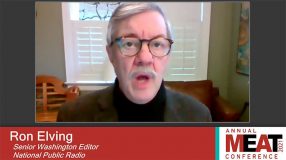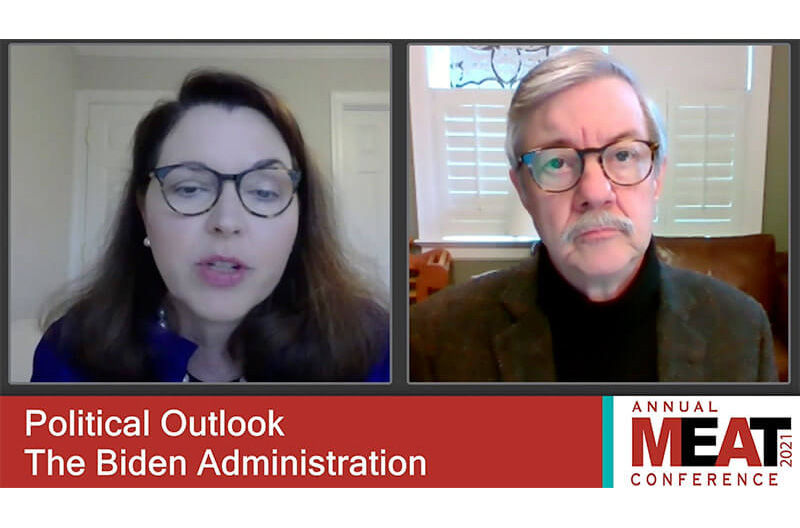by Eric Pereira / staff writer
Ron Elving, National Public Radio Washington’s senior editor, predicts a “a very productive time” for people who want to address inner-city food deserts and communities where running a retail grocery operation is difficult.
“I think [food insecurity] is one of those places where you’re going to see very good cooperation between this particular Department of Agriculture and this particular leadership in Congress,” he said.

The WIC and SNAP programs are going to be priorities across the executive, administrative and legislative functions, according to Elving.
As part of the “Political Outlook” session Wednesday during the virtual Annual Meat Conference, the veteran journalist also offered insight on wage increases, climate change legislation and COVID-19 vaccine distribution.
Elving noted that changes lie ahead with Rep. David Scott succeeding former Rep. Collin Peterson as the chair of the House Agriculture Committee.
“He is a very different Democrat, a very different profile from what has long prevailed on the Agriculture Committee,” Elving said. “He comes from metropolitan Atlanta, he has represented parts of the city of Atlanta and…surrounding counties to the south. And that is a very different set of priorities.”
Scott’s constituents, many of them people of color, likely are more focused on obtaining food rather than production and processing.
“[His constituents] are very much the customers of retail, they are very much the people who are providing the market,” Elving said. “And this is the future. And we see it arriving kind of unexpectedly, right now, in this 117th Congress, but particularly in terms of House leadership.”
Moderator Jennifer Hatcher, chief public policy officer and SVP at FMI – The Food Industry Association, brought up tax legislation. The national debt continues to rise in every administration, a trend Elving doesn’t foresee ending.
“Every time we pass a tax cut, we say we’re going to restrain spending, or we say the tax cut is going to so induce economic growth that it will pay for itself,” he said. “It always does induce economic growth, and it always helps revenue, but it doesn’t seem to close the gap. We still keep adding and adding and adding to the national debt.”
He noted that there seems to be an “implicit consensus” between both parties that other things currently matter more than the national debt.
Elving predicts Democrats pursuing topics such as COVID-19 relief, infrastructure and immigration, but that they will hold off on a tax raises for corporations potentially until 2022 or later.
Asked for one thing to watch in the public policy arena, Elving pointed to the U.S. Senate.
“I would not have anticipated a very short time ago that the Senate would have been as much in question, in flux,” he said. “It is really the place where everything is going to either happen or not happen in the next year. And I think what we can foresee at this point is almost nothing, except that there are some very wide differences of potential outcome.”

